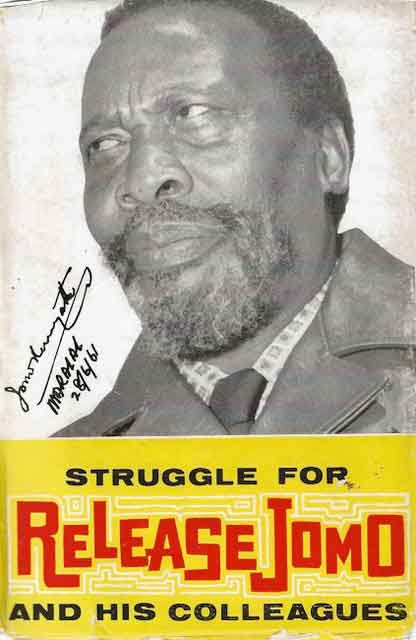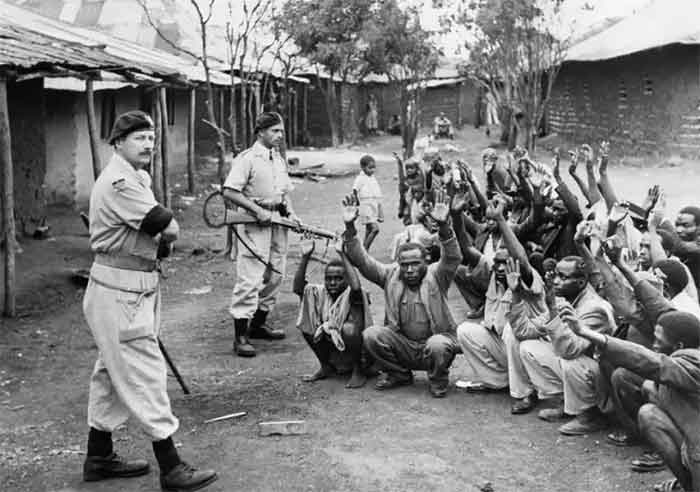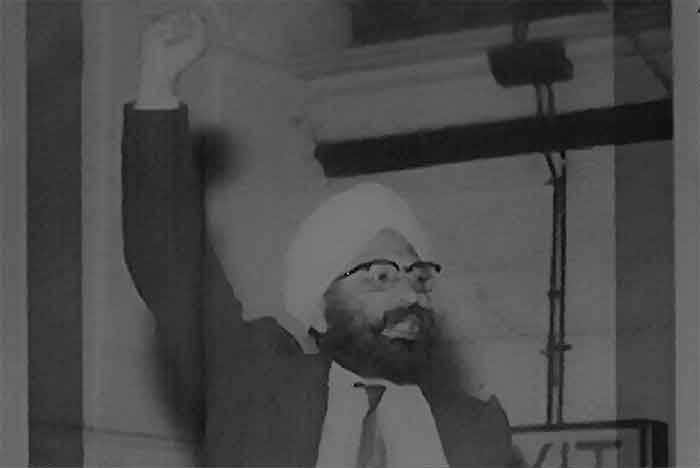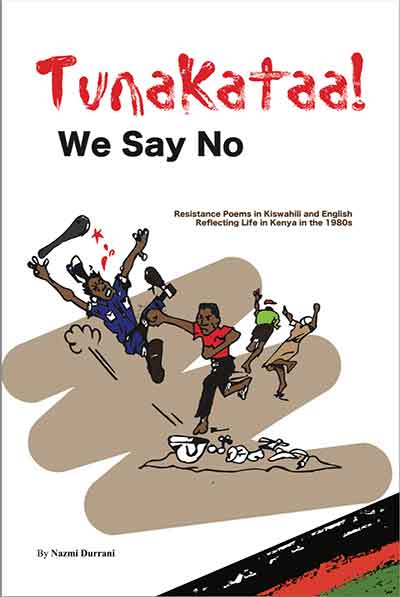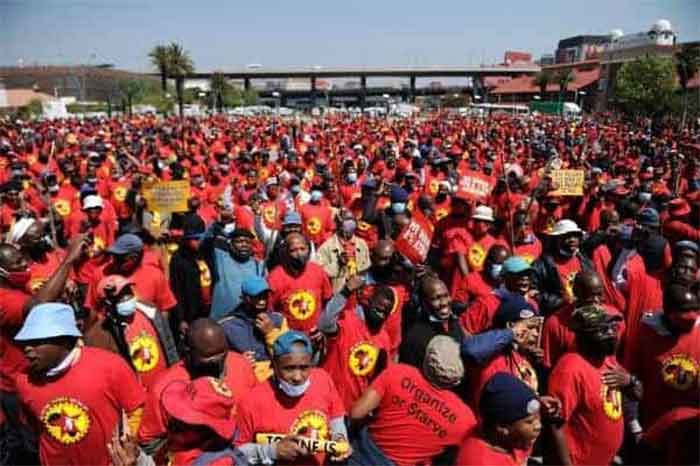
Trade Unions have played a crucial role in Kenya’s anti-colonial, anti-imperialist and anti-capitalist struggles in Kenya. This assessment is confirmed by several studies including one from 1998 and the other from 2023 that are quoted below. It is instructive to understand this activist trade union movement that led to political independence and then to compare it with the current powerlessness of the trade union movement.
Omari Onyango (1998) shows the link between trade union activities and political struggles when he examines the role of trade unions before independence:
During the colonial period, trade unions became a most important avenue of self expression in Kenya due to restrictions on open political activities. A number of earlier national leaders cut their political teeth at the worksites. Trade unions enabled the freedom fighters to organise viable and dynamic political activities. It was difficult for the colonial government to crack down on political leadership organised around trade unions due to the fear that it may disrupt the provision of labour and the economy. The role of trade unions in ushering in independence can therefore never be underestimated.
This indicates the close working relationship between workers and trade unionists on the one hand, and those active at the political level, on the other. It also indicates the role of trade unions in linking their economic struggles for better wages and work conditions with their political role in ensuring that the economic and political system in the country was responsive to the needs of working people. This coming together of trade unionists and politicians on the one hand and the economic and political aims of trade unions, on the other was the key foundation that brought success to both the political and trade union movements. These then gave Mau Mau its ideological and organisational direction. These links become clearer when lives of trade unionist who were also active on the political front are examined. This Gaitho (2023) does very well in his interview of Maina Macharia, the ‘freedom war veteran and pioneer trade unionist’, as Gaitho describes him. Gaitho points out various stages of the history of Maina Macharia as he combines political and trade union roles, starting with his work in Mombasa in 1950s:
He became a committee member of the local branch of the Kenya African Union, which was a cover for the Mau Mau. as well as the Mombasa branch of the Transport and Allied Workers Union. In both, he worked under coastal nationalist Muinga Chokwe.
Maina Macharia then worked with several activists and became one of the Mau Mau War Council’s five members which included another trade unionist, Pio Gama Pinto who became the ‘Kenya’s first famous victim of political assassination after independence’.
It is necessary to realise that being active in trade union and political work does not come without high cost. Gaitho records that Maina was first arrested in 1953 and ‘spent the next eight years in various prisons and detention camps’. Most progressive trade unions in Kenya spent time in colonial and comprador prisons and detention camps, for example Bildad Kaggia, Pio Gama Pinto and Makhan Singh, among others. This is perhaps one reason that trade unionists today fear standing up for their trade union and political rights against repressive governments, as the ones in Kenya after independence.
Maina, however, continued his militant trade unionism after independence. He was full-time official of the Kenya Union of Domestic, Hotels, Educational Institutions, Hospital and Allied Workers Unionfrom 1964 to 2001 when he retired. Maina Macharia was thus one of the many trade unionists who were active in trade unions, in national politics and also in Mau Mau war of liberation. Their example helps to see the role of militant trade unions in Kenya.
However, the period after independence saw a marked decline in the power and activities of trade unions. Ironically, it was a former trade unionist, Tom Mboya who had been supported by USA before independence, who led the government attacks on trade unions. Onyango (1998) explains the damage done to trade unions by actions of the first government after independence:
As the country ushered in independence, a number of trade union leaders formed part of the core of the nascent government. One of them, the late Tom Mboya was at the nerve centre of the new government. Having served as a secretary general of the umbrella national trade union body, he understood better than anybody else the formidable potential of the labour movement. He was therefore instrumental in establishing a direct and controlling involvement of the government in the affairs of the labour movement. The constitution of the labour movement was drafted in the attorney general’s office. One of the most devastating provisions inserted by the government is that of allowing the country’s president to appoint the secretary general of the umbrella labour movement from a list of three names presented to him by the electoral college of the labour movement. …To make matters worse, the same government, through its labour offices, supervises the movement’s elections and retains the power to confer legality or lack of it to such an exercise.
Onyango (1998) shows the end result of the government action on trade unions:
By allowing the government to be closely involved in its affairs, the labour movement defence attorney has joined the ranks of his enemies. If the doctor has become the disease, how can the patient heal? It can be excusable if the government’s policies are for the general welfare of the worker. But a government that maintains a slave mentality against the worker and abdicates its responsibilities against the potential worker does not deserve to be graced by the presence of the CEO of the labour movement among its ranks. This is the height of betrayal to the workers of Kenya.
This betrayal has ensured that the trade union movement is so weakened that it can no longer protect and promote the interests of working class. To make matters worse, illegal and hidden actions of the government then silence any trade unionist who stands up to fight for workers’ rights. This is exemplified by the case of Omari Onyango himself who was the general secretary of the Kenya Universities Union and Chair of the International Centre of Trade Union Rights (ICTUR) Kenya chapter. Onyango (1008) explains his own treatment at the hands of the Kenya government:
On 8th August 1997, the state’s security apparatus set out to arrest the writer of this article who is the current chairperson of the chapter. Although no formal reason has been offered and never will [be], this attempted arrest stems from my role in the constitutional reform movement in general and my determination to revive the labour movement in particular. I have been forced out of Kenya not only due to the possibility of my certain arrest, but much more due to constant threats on my life.
The example of Onyango is but one of many such actions by the Kenya government which uses laws it controls, the armed forces and the use of its hidden hit squads to silence trade unionists. Given this situation, it is not surprising that the trade union movement today is a shadow of what it was before independence. The comprador governments have exceeded the actions of colonial government in suppressing dissent and challenges to its dictatorship of bourgeoisie.
But all is not lost. The all-powerful ‘Great’ British Empire was defeated by people of Kenya to win independence. This required the three pillars of resistance to unite and work together with a joint ideological and political platform. The three pillars were the trade union movement, people’s resistance which then united to become the third pillar, Mau Mau. They jointly fought for land and freedom. Some aspects of the three pillars are considered in the three short books by Durrani (2018). This history teaches lessons for the future. The three pillars will need to come together again under an anti-capitalist, anti-imperialist agenda to fight for socialism. And there is evidence of this happening in a small way under the continuing anti-working people agenda of the IMF-inspired government of Kenya today. The role of raising class consciousness of working people has been taken over today by young activists. Many set up study circles; others have produced podcasts such as ‘Until Everyone is Free’’, the Organic Intellectuals study, write and promote resistance history; Ukombozi Library is becoming a centre of liberation; children and young people at Mathare have set up their own Ukombozi Library and are busy learning and dancing to the songs of resistance. Okakah Onyango, in his article Lessons in Forging Freedom: The Nexus of Trade Unions and Mau Mau in this book shows the growth of this new awakening. There is a possibility that these, and other similar initiatives, can bring about a new unity of all working people and peasants who are all waging their own struggles against anti-people policies of the government. They are, after all, part of the people of Kenya who provide workers for industries, plantations and services in towns and countryside. Can the trade unions remain aloof from this national trend for long? The pressure to change the status quo in trade unions will not come from the top. It is already making waves from the bottom, from the youth who form the largest community of Kenya. They will not tolerate the dictatorship of bourgeoisie for ever. Their parents and grandparents have shown the way – the way of unity of workers, peasants and working people and peasants for Land and Freedom. This wave will, in time, re-awaken trade unions to their real task in the society.
–
The short articles below should then be read with this background in mind. They were written as resource for the on-line course on Trade Unions, Class and Politics run by Ukombozi Library in Nairobi. The course was based on a similar one delivered by the Marx Memorial Library, but a number of modules related to Kenya were added to make it relevant to conditions in Kenya. Just as the trade union movement in Kenya has been suppressed, reading and learning material on trade unions itself has been suppressed. It was therefore necessary for these articles to be written to provide a political understanding of trade union studies. The author would like to thank the Editor of countercurrents.org which published all the articles and so made them available to a wider readership. Their reproduction in this book is aimed mainly at readers in Kenya, East Africa and Africa in general. One of the advantages of being published in countercurrents is that the articles can be easily translated into any language and so can reach French, Arabic and Kiswahili speakers in Africa. They can also be spoken for those who are not able to read.
—Endnote:
Preface to Part 2 of the forthcoming Kenya edition of Nigel Flanagan (2022): Preface Our trade unions, what comes next after the summer of 2022. Selected Readings on Trade Unions, Power & Politics By Shiraz Durrani. To be published by Vita Books (Nairobi).
References
Durrani, Shiraz (2018): Nairobi: Vita Books:
- Mau Mau: the Revolutionary. Anti-Imperialist Force from Kenya: 1948-1963. Available at: https://www.africanbookscollective.com/books/mau-mau-the-revolutionary-anti-imperialist-force-from-kenya-1948-1963
- Trade Unions in Kenya’s War of Independence. Available at: https://www.africanbookscollective.com/books/trade-unions-in-kenyas-war-of-independence
- People’s Resistance to Colonialism and Imperialism in Kenya. Available at: https://www.africanbookscollective.com/books/peoples-resistance-to-colonialism-and-imperialism-in-kenya
Gaitho, Macharia (2023): Mau Mau: Empty Honours. Sunday Nation. 31-12-2023. pp. 2021.
Onyango, Omari (1998): Union Role in Kenya. International Union Rights. Vol. 5 (1) 3-4.
Until Everyone is Free. Podcast available at: https://podcasts.apple.com/gb/podcast/until-everyone-is-free/id1539892066
Shiraz Durrani is a Kenyan political exile living in London. He has worked at the University of Nairobi as well as at a number of public libraries in Britain. He then lectured at the London Metropolitan University. Shiraz has written many books and articles on aspects of Kenyan history and on politics of information in the context of colonialism, capitalism and imperialism. His forthcoming publication is A Struggle of Sixty-Two Days, A Play based on the 1936 strike for eight-hour working day in Kenya.
Some of his articles are available at https://independent.academia.edu/DurraniShiraz and books at: https://www.africanbookscollective.com/search-results?form.keywords=shiraz+durrani. His articles on countercurrent are available at: https://countercurrents.org/author/shiraz-durrani/


